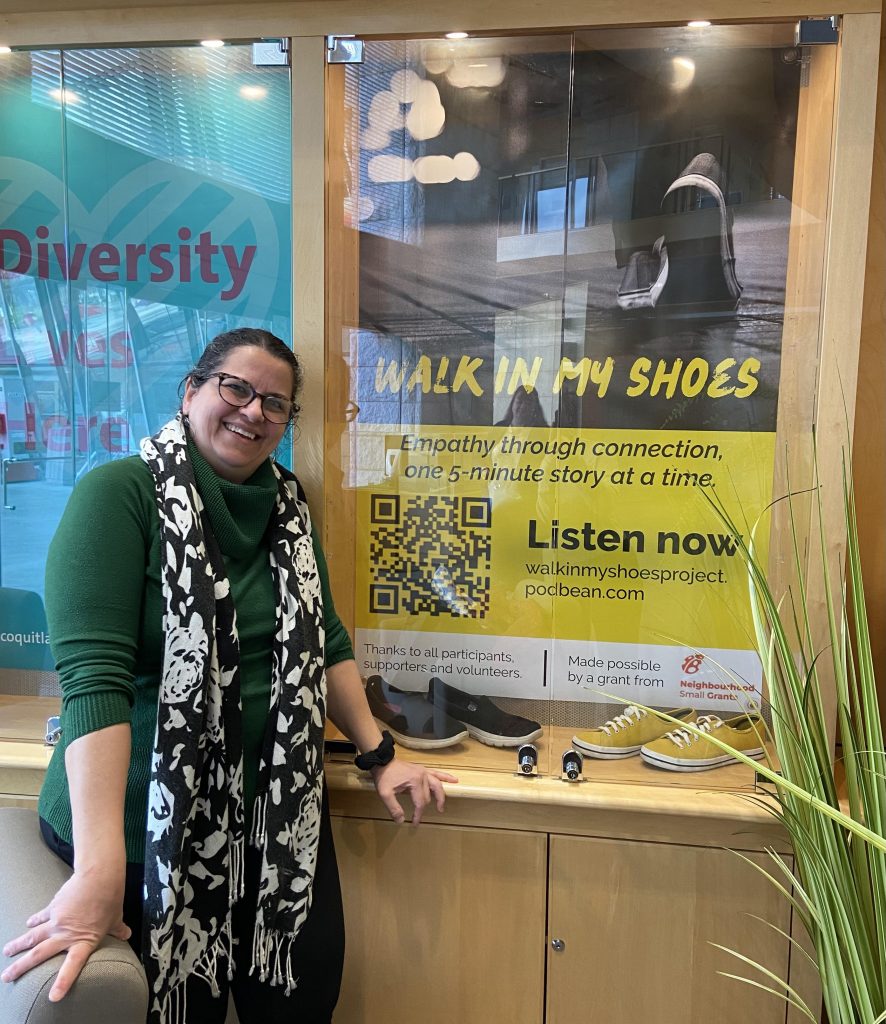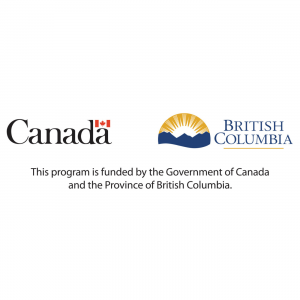Carla Carvalho, a registered clinical counsellor at Strawberries and Sunshine Wellness Collective in Port Coquitlam, B.C., has always been passionate about storytelling as a pathway to empathy and healing. Originally from Brazil, Carla came to Canada in December 2015 and experienced life as a newcomer in Canada as “a bumpy road in terms of settling as an immigrant,” in large part because recertification in her area of expertise was logistically and financially challenging, and employment opportunities relied heavily on referrals and references (which, as a newcomer, were not easily available to her).
In 2022, after taking stock of her own experience and the stories of those she is in relationship with personally and professionally, she decided to apply for a Neighbourhood Small Grant (NSG) from the City of Coquitlam. She proposed that the grant would support her in developing a project she called Walk in My Shoes, which would invite people to take short walks while listening to stories shared by newcomers to Canada. By scanning a QR code, folks would be directed to a podcast series that showcased stories shared by five immigrant women in the Tri-Cities area. Carla hoped that the paired acts of walking and listening would enhance belonging, cultural awareness, and connection in her community. Her grant application was successful, and the podcast stories launched in March 2023.

That same month, Carla applied to the RADIUS Trampoline program, already focused on a new idea and thinking that Walk in My Shoes was behind her. At the time, she was thinking through how to set up a multi-language mental health centre that would ease the process for immigrants to access therapy, as Carla knows immigration is a traumatic experience. When the program started, Carla was juggling her work as a registered clinical counsellor, her family life, and her other priorities while trying to hold space for her brand-new idea to take shape. Then she learned that Walk in My Shoes was to have a second wind: the City of Coquitlam wanted to support her project through the Cultural Display Program and feature the project at City Hall during Celebrate Diversity Month.
After a few discussions about everything that was on her plate, she realised that developing her multi-language mental health centre was a very long-term plan. Walk in My Shoes, on the other hand, having started small, had the opportunity to gain momentum through the activities of Trampoline. Carla could picture herself channelling her energy into creating a more immersive experience for the residents of Coquitlam and for a variety of unique communities — she was curious about how the project could grow, and she decided to make the iterative development of Walk in My Shoes the new focus of her time in Trampoline. She said yes to displaying Walk in My Shoes at City Hall and approached the librarian at the City Centre library about displaying the project there as well. Together, they came up with the idea of displaying the posters and making bookmarks with the QR codes on them available to the public at the City Centre and Poirier library branches.
To deliver on the City Hall and library showcases, Carla worked closely with the municipality’s Equity, Diversity, and Inclusion department to launch the initiative in the media and promote the exhibits. By the time the program was over, Carla had learned so much about the intricacies of the project: about how the system works and about the appeal of the project to government institutions and different service agencies. She started to see how adapting the stories’ format and style could extend her impact and meet the needs of different audiences while continuing to spark conversation in and around Coquitlam.
“The pilot version of Walk in My Shoes was about the stories of five immigrant women who live in the city, showcased in central locations,” Carla explains. “I am now interested in linking places in the community to stories of people in the community that link to social issues, like stories of special needs, immigration stories, and stories of homelessness. So, I want to work with people who want to talk about those places, telling their stories around those places. Like, when a person is at a certain specific place in the city, let’s say they are going for a walk on the trail by the river, for example, they walk around and listen to these stories about people around that place and make an empathetic connection.”
For her project to be successful, Carla understands that supporting people in telling their stories will be critically important. “I don’t want people just to write these stories and send them in for us to select or not,” she says. “No, I also want people to learn a new skill: storytelling. Because this is healing. I want this work to give voice to vulnerable people. I want listeners to learn something new and experience a sort of cognitive shock through the power of storytelling.”
Following Trampoline, Carla is taking Walk in My Shoes into RADIUS’ Build program to continue developing the next iteration. She’s thinking through the kinds of storytelling supports that will be helpful, identifying meaningful places in the city, deciding how to invite participants to tell their stories, and determining how to display the stories to make them accessible to as many listeners as possible. If you are interested in listening to the stories featured in Walk in My Shoes, you can click here for access to the audio recordings on PodBean.
The Refugee Livelihood Lab is part of a growing movement supporting deep shifts in the systems which govern our lives towards equity, dignity, and sustainability for all people and the planet.
Thank you to our funders Ministry of Social Development and Poverty Reduction, and WES Mariam Assefa Fund (MAF).



